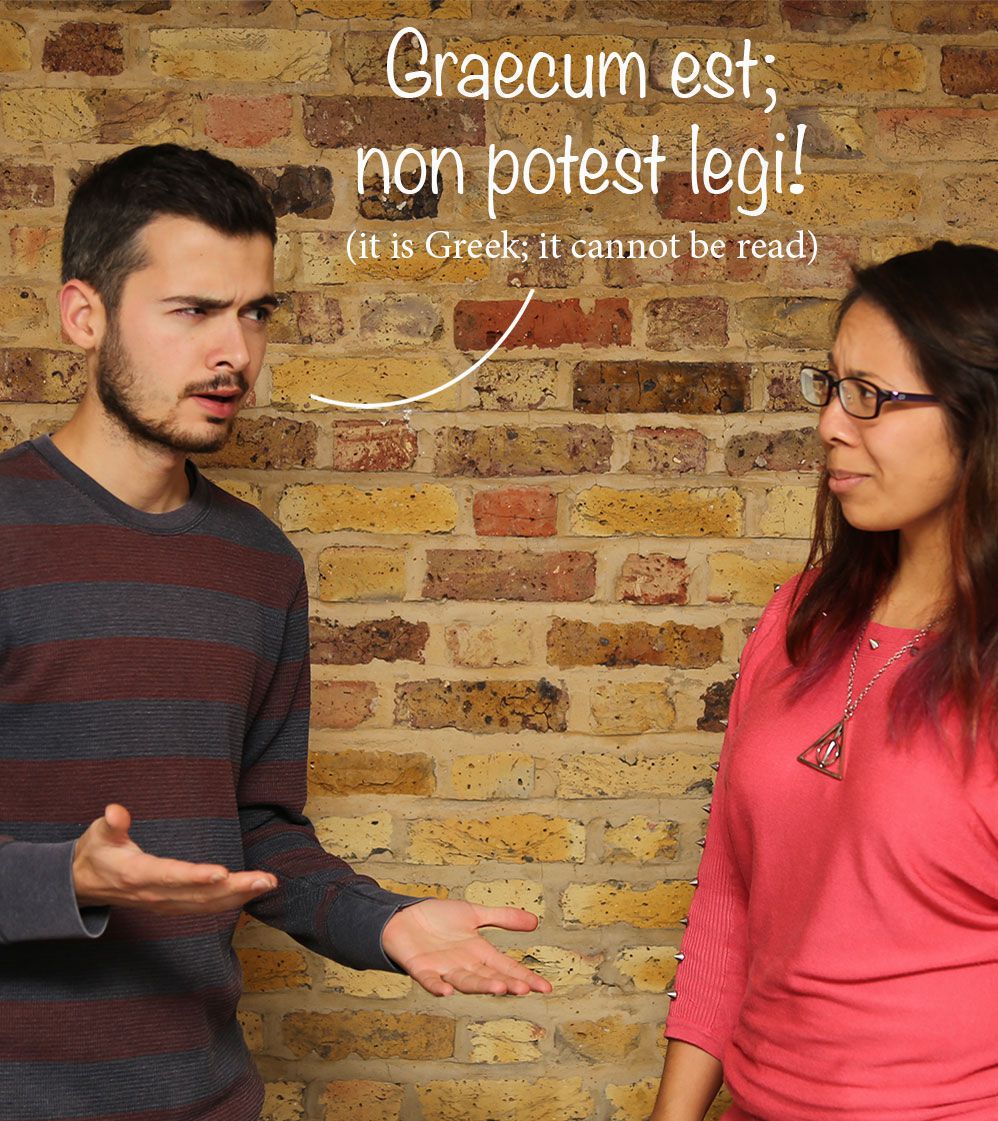How does a Greek person say ‘it’s all Greek to me’?
‘It’s all Greek to me’. This is what an English speaker might say when they don’t understand something at all. In this context the Greek language is used as a metaphor for ‘something incomprehensible’.
So that got us thinking here at EuroTalk… if an English speaker uses Greek, what does a Greek speaking person use? And in fact how does this expression translate in other languages?
Well as it turns out there is a (somewhat complicated sounding) term for this – ‘language of stereotypical incomprehensibility’. So Greek is the language of stereotypical incomprehensibility in English.
Other languages have similar expressions and they usually pick as a metaphor for ‘impossible to understand’ a foreign language with an unfamiliar alphabet or writing system.
To answer our original question: in Greek the language used as a metaphor for incomprehensibility is Chinese.
Chinese actually turns out to be the most popular choice as a synonym for ‘I do not understand’ and is used in many languages, including Albanian, Arabic, Bulgarian, Catalan, Dutch, Estonian, French, Greek, Hebrew, Hungarian, Latvian, Lithuanian, Polish, Portuguese, Romanian, Russian, Serbian, Spanish, Ukrainian.
Greek itself follows closely, and is used as a language of stereotypical incomprehensibility in: English, Afrikaans, Norwegian, Portuguese, Swedish, Spanish, Polish, Persian.
(Bonus fact: the origin of the phrase in some European languages can be traced to the Medieval Latin proverb, ‘Graecum est; non potest legi’, which translates to ‘It is Greek; it cannot be read.’)
Sometimes the language of incomprehensibility is not a specific human language at all. For example a Chinese (Mandarin) speaker would use something that translates roughly to ‘Ghost’s script’, ‘Heavenly Script’ or ‘Sounds of the Birds’. And a Cantonese speaker might say, ‘These are chicken intestines.’
And how about a constructed international language, such as Esperanto? As a tongue-in-cheek reference, an Esperanto speaker would say ‘That’s a Volapük thing’, Volapük being another constructed language (with about 20 speakers).
How about you? What language do you use to mean ‘incomprehensible’? And is your language used by any other languages as a synonym for ‘impossible to understand’?
Bonus points question:
What does a person whose mother tongue is Greek, but who also speaks English, say in English when they want to say ‘It’s all Greek to me’?
Nikolay
It’s Raining Cats and Dogs (and Wheelbarrows and Old Ladies)
‘It’s raining cats and dogs!’ is a common British phrase meaning that it’s raining particularly hard. There are various theories as to where the expression came from – although there’s no evidence that it’s ever actually happened!
It may come from the Greek expression cata doxa. This means ‘contrary to experience or belief’ and might explain why the expression is used when it’s raining unusually hard.
Equally, it could be derived from the old French word catadupe, which meant waterfall.
An old theory was that in heavy rain, dead animals would often be washed out of drainage systems on 17th century buildings in Europe.
There’s no conclusive answer. It may just be that it was a funny expression that caught on and became popular. We’ll probably never know…
In Britain it also rains buckets, stair rods, tacks and pitchforks… But did you know that in other areas of the world, it rains other things?
Our favourites are:
‘It’s raining wheelbarrows’
Czech: Padají trakaře
‘It’s raining knives and forks’
Welsh: Mae hi’n bwrw cyllyll a ffyrc
‘It’s raining shoemakers’ apprentices’
Danish: Det regner skomagerdrenge
‘It’s raining fire and brimstone’
Icelandic: Það rignir eld og brennustein

‘It’s raining lady trolls’
Norwegian: Det regner trollkjerringer
‘It’s raining husbands’
Spanish: Están lloviendo maridos
‘It’s raining old women with knobkerries’
Afrikaans: Ou vrouens met knopkieries reen (by the way, a knobkierrie is a kind of African club!)
‘It’s raining snakes and lizards’
Brazilian Portuguese: Chovem cobras e lagartos
‘It’s raining frogs’
Polish: Leje zabami
We’d love to know where some of these expressions came from, so if anyone has any information, please share it in the comments!



